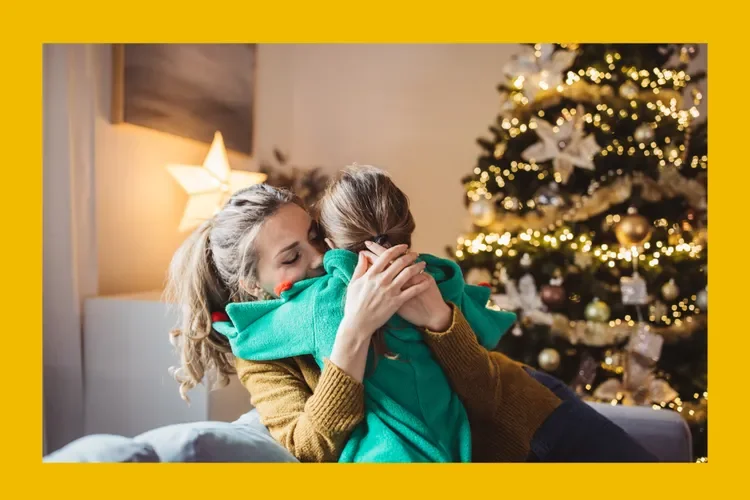Co-Parenting During the Holidays? Here’s How To Make It Easier for Everyone
The holiday season can be tough on everyone when parents are separated. But one mom shares how she found peace.
Parenting after divorce was tough on mom of three Callie Christensen, and navigating the holidays was particularly challenging.
“Any time we approached a new holiday on the other side of the separation, I experienced an immense amount of anxiety and grief around the change of those moments,” says Christensen, who finalized her divorce in 2020.
She recalls how unnatural it felt in the beginning to spend only part of Christmas Day with her children, who are now ages 8, 10, and 14.
“I had to be very gentle with myself and my kids, because I knew that if I was feeling this way, they were too,” says the co-founder and chief brand officer of Slumberkins.
She’s far from alone in her feelings. For co-parents, the holiday season can bring both joy and tension. While the holidays are often portrayed as a time of perfect family harmony, for many households it’s a logistical puzzle. From deciding where the kids will spend the holidays to managing different family traditions, co-parents face the challenge of balancing fairness with flexibility. It can also cause a mix of emotions in kids.
“They often share the excitement of celebrating with all their loved ones, and sadness that they only get to see certain people for a portion of time,” explains Nikki Huijun Li, LMFT, R-DMT, based in Boston. “They particularly struggle when the co-parenting team do not have a good relationship, which makes the transition between households cold and uncomfortable, a stark contrast from the expected holiday atmosphere.”
The key lies in communication and planning ahead, while maintaining stability and a sense of belonging for the children. Here’s how co-parents can do that.
Create a Clear Plan
The best way to approach co-parenting during the holidays is to communicate a clear plan that works for your family, says Li. That includes how much time will be spent at each household and who will be in charge of pick-up/drop-off. And make sure to communicate that to your children, too.
That’s the approach Christensen and her family take. Although she has the kids the majority of the time because of her ex-husband’s work schedule, they opt for an even split during the holiday season.
“Over the winter holiday, we split the break from school 50/50, and we flip years,” she shares. “So, one year, I have the kids from when they get out of school until 12 p.m. on Christmas Day, and then the next year, it flips and they come home to me at 12 p.m. on Christmas Day.”
While Christensen’s now 8-year-old daughter, Cora, says she’d prefer celebrating the holidays in one household and misses each parent when she’s away from them, she looks forward to the perks that she experiences in her two homes.
“I like it at dad's when it's Easter because he has a really big backyard and he can hide lots of eggs there,” she says. “But I like it when it's Christmas with mom because mom has a very big tree.”
Of course, every family’s ideal situation will be different. It can help to work together with your kids to create the schedule, and you can make it fun with a visual arts activity.
“It could be a color-coded calendar with days marked by where the child is staying, or a co-created drawing of the households with the people who will be present,” says Li. “As an expressive arts therapist, I do this with children around the holiday often and it really helps. It's not about making great art, just an age-appropriate way to help children understand what to expect.”
Validate All Emotions
Having to split time can be hard on parents and children. Allowing yourself and your children to feel any emotion that can come from that is important.
“I think the hardest but best thing I did for all of us was to just allow space for the sadness and the grief that happens when you lose a family unit,” says Christensen. “It was so hard and we cried lots of tears.”
Sometimes her kids didn't even know why they were sad, but she felt they needed to process the sorrow they felt in their hearts. Keep in mind, sadness may not be the only emotion kids show. Li says it’s important to acknowledge all feelings, including confusion and anger, and encourage kids to work through them.
“Create a safe space or a feelings corner where the child can safely share all feelings, draw their emotions, and maybe request hugs,” she says.
While it may feel difficult at times, Li adds, “Show respect, kindness, and even affection to the co-parenting team if possible, and never put the child in the middle of arguments.”
“I think the hardest but best thing I did for all of us was to just allow space for the sadness and the grief that happens when you lose a family unit.”
Focus on Traditions
Continue old traditions or create new ones that work for your family to give kids something to look forward to each holiday—even if they vary from house to house. Along with creating happy memories, holiday traditions foster connection and belonging, which can positively impact mental health.
Christensen and her family have found ways to keep their holiday traditions alive, even if the day and time of them changes each year.
“We both do have Elf on the Shelf, which the kids love. We like to play into the mischief of it,” she says. “We each try to squeeze in some of our holiday experiences throughout the month of December like going on a Christmas train or going to pick out the Christmas tree on our weekends that we have the kids leading up to the break from school.”
Give Yourself Grace
Co-parenting may mean the holidays look different than you once imagined—and that’s OK.
“I’ve had to let go of the idealistic or ‘perfect’ Christmas in my own mind and just be as grounded, intentional, and present for my kids as I can be,” says Christensen.
That can be hard to do if you’re newly co-parenting but Christensen says, over time, it’s likely your family will adjust.
“Things did get easier,” she says. “My eased into a new way of functioning that became their new normal and everyone knew what to expect.”

